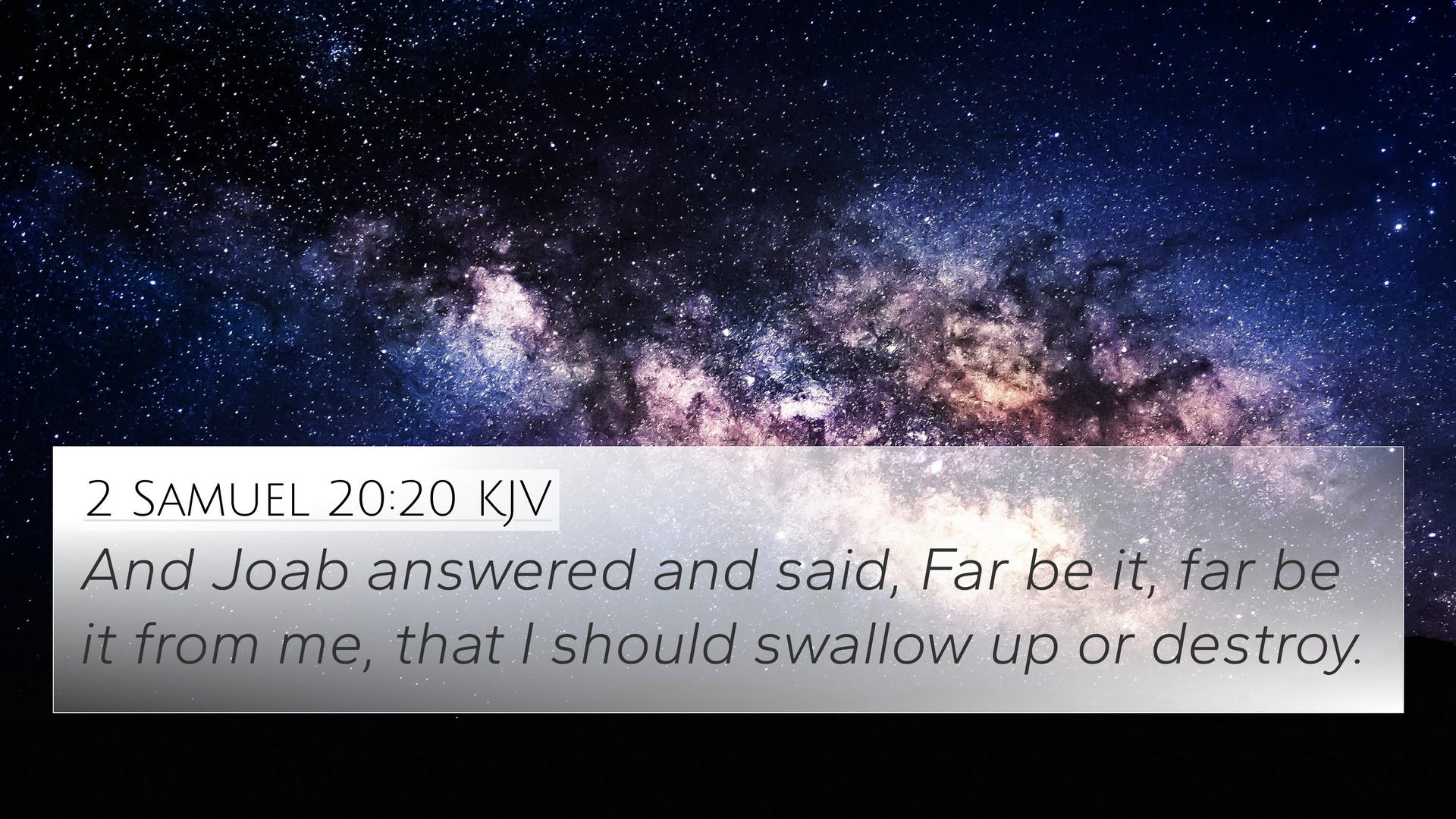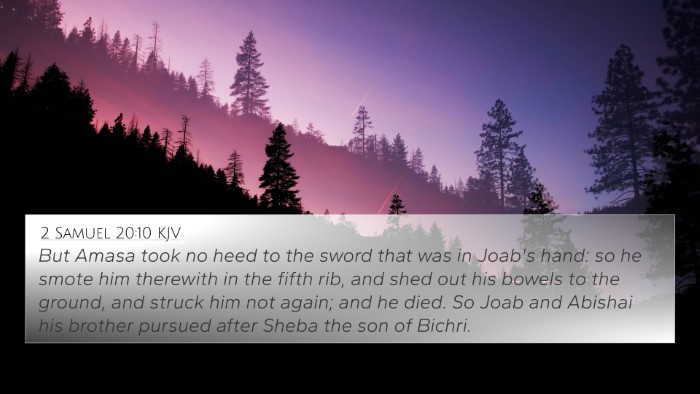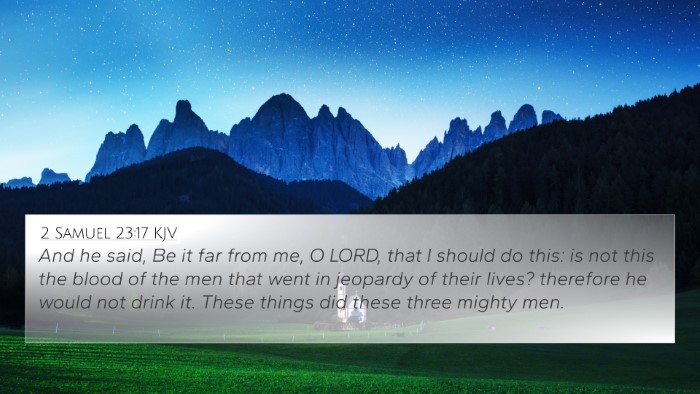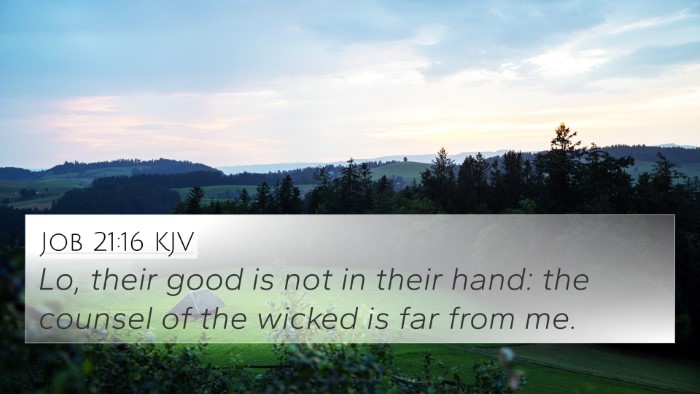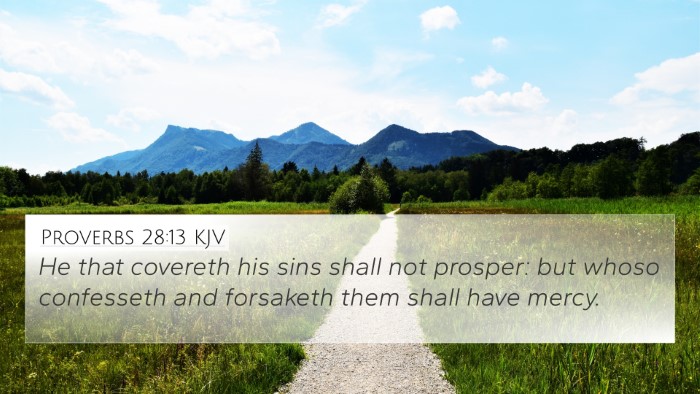Understanding 2 Samuel 20:20
Verse: 2 Samuel 20:20 - "And Joab answered and said, 'Far be it, far be it from me, that I should swallow up or destroy.'"
Overview of the Verse
This verse depicts a critical moment in the narrative surrounding Joab, the commander of David's army, during Absalom's rebellion. His response signifies his complex character and his role in the kingdom of Israel. Joab is expressing a denial of intent to destroy the city of Abel, indicating a need for diplomacy amidst conflict.
Insights from Public Domain Commentaries
Matthew Henry's Commentary
Henry emphasizes Joab's commitment to not act destructively against the innocent while fulfilling his duties as a military leader. His statement can be seen as an appeal to reason, highlighting the value of preserving life and demonstrating that warfare is not merely about conquest but also about justice.
Albert Barnes' Notes
Barnes explains that Joab's declaration serves as a vital reminder of mercy and prudence in the heat of battle. He points out that Joab acknowledges the risk of unnecessary bloodshed and aims to remind his fellow soldiers of their responsibility to protect the people, underlining the sanctity of life.
Adam Clarke's Commentary
Clarke delves deeper into the implications of Joab's refusal to destroy Abel. He presents Joab as a figure torn between loyalty to David and the ethical implications of his military actions. The verse teaches that leadership requires careful consideration of both duty and moral responsibility, showcasing Joab's awareness of the broader consequences of warfare.
Bible Verse Cross-References
This verse connects with several other passages that reinforce themes of leadership, mercy, and the challenging nature of war. Below are key cross-references:
- 1 Chronicles 11:6: Highlights Joab’s courage and military prowess.
- 2 Samuel 3:39: Reflects on Joab's tension with David and his understanding of justice.
- 2 Samuel 12:9: Discusses David's sinful choices and their consequences, signifying the need for moral clarity in leadership.
- Proverbs 29:2: States that "when the righteous are in authority, the people rejoice," indicating a principle of righteous leadership.
- Matthew 5:9: "Blessed are the peacemakers," supporting the idea of seeking peace in situations of conflict.
- Romans 12:18: "If it is possible, as much as depends on you, live peaceably with all men,” calling for diplomacy over conflict.
- 1 Samuel 24:6: Displays David's refusal to harm Saul, personifying mercy in leadership.
Thematic Connections
This verse unveils essential themes such as:
- Leadership Responsibilities: The burden of leadership includes protecting the innocent even in conflict.
- Mercy and Justice: Balancing military duty with ethical considerations is crucial.
- Conflict Resolution: Finding ways to resolve disputes without resorting to destruction is paramount.
Cross-Referencing Biblical Texts
Using tools for Bible cross-referencing enriches understanding of individual verses and their connections. Here are some helpful resources and keywords to consider:
- Bible concordance
- Bible cross-reference guide
- Cross-reference Bible study
- Tools for Bible cross-referencing
- Comprehensive Bible cross-reference materials
How to Use Bible Cross-References
Cross-referencing involves identifying similar themes and teachings across different scripture. Here are methods to strengthen your cross-referencing skills:
- Consulting a Bible concordance to find related verses.
- Using study Bibles that provide cross-references alongside the text.
- Engaging with thematic Bible verse connections to explore broader messages.
- Conducting a comparative study of Pauline epistles for parallels in teachings.
Example Queries
For further exploration, consider questions such as:
- What verses are related to 2 Samuel 20:20?
- Find cross-references for Joab’s dialogue in 2 Samuel.
- How do 2 Samuel 20:20 and Matthew 5:9 connect?
Conclusion
The verse 2 Samuel 20:20 invites reflection on the ethical responsibilities of leaders during conflict. By engaging in cross-referencing biblical texts, readers can deepen their understanding of the intricate relationships between themes of mercy, justice, and leadership found throughout Scripture.
